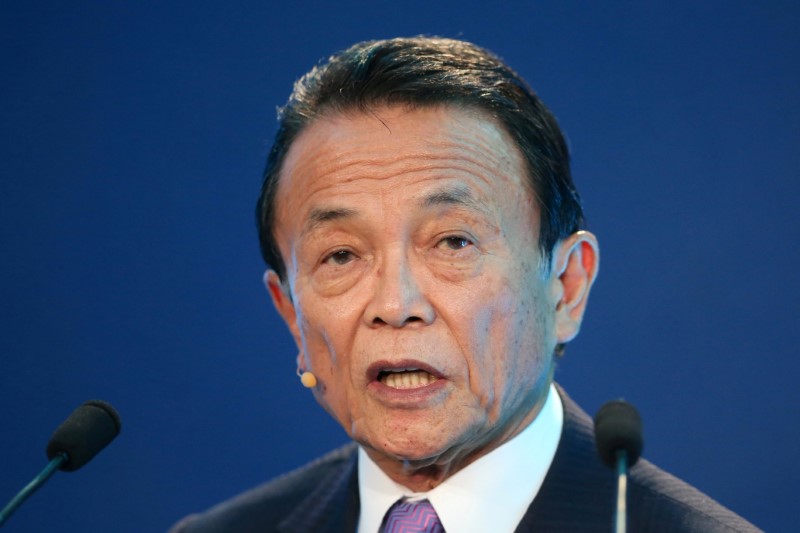By Tetsushi Kajimoto and Leika Kihara
TOKYO (Reuters) - Senior Japanese policymakers on Friday said they may need to adjust calculations underlying the country's plans to trim spending, an indication the government could look to water down previous pledges to improve fiscal prudence.
The statements are a nod to recent reports premier Shinzo Abe will delay the timing for meeting fiscal reform goals to allow scope to boost spending on education.
Finance Minister Taro Aso said no decision has been made yet by the government on whether to delay its goal of achieving a primary budget surplus in fiscal 2020.
But he added the ministry would need to do fresh calculations to see whether the target can be met if part of revenues from a planned sales tax hike in 2019 are used on education and child care.
"We originally decided to allocate revenues from the tax hike mainly on social security. If the ratio (for other spending) rises, we need new calculations on whether the primary balance target can be achieved by fiscal 2020," he said.
"Our broader stance is to aim for both fiscal consolidation and economic revival. Therefore, we will make considerations based on this stance," he told a briefing.
Economy Minister Toshimitsu Motegi also told reporters on Friday that while cost-cutting efforts were necessary, the government would be flexible in reviewing the fiscal target.
"There's no change to our stance of doing our utmost to cut spending toward year-end ... But we'd like to scrutinize what the fiscal target should look like" toward a mid-term review of Japan's fiscal policy scheduled next year, he said.
The remarks contrast with their earlier comments repeating that Japan will stick to its fiscal consolidation target to ensure it does not lose market trust over its finances.
The government has vowed to turn Japan's budget balance to a surplus in the fiscal year ending in March 2021, as a crucial step to rein in the world's heaviest public debt burden at twice the size of Japan's economy.
But government sources have told Reuters Abe is set to delay the timing for achieving the target to divert more revenues from a scheduled sales tax hike in 2019 on education, ahead of a snap election he is expected to call in October.
Abe will unveil the decision on Monday at a news conference at which is he expected to formally announce his plan to call a snap election, the sources said.
Aso also said he had no plan to issue deficit-covering bonds to fund the cost of education in the future, an idea floated by some ruling party lawmakers.

A primary budget balance, which excludes new bond sales and debt servicing costs, is a key gauge of measuring how spending on policy measures is financed without relying on debt.